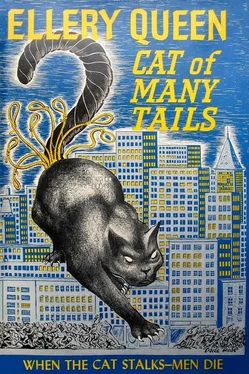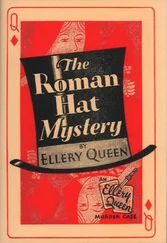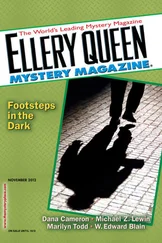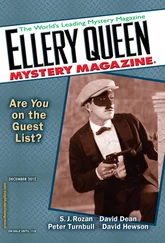“Yes.”
“Sounds tasty, but is it kosher?”
“Mr. Queen.” Celeste hesitated.
“On second thought,” said Jimmy, “this is a very delicate situation. It raises all sorts of possible conflicts.”
“I’m going to need you, Celeste — when I do — on a moment’s notice.” Ellery frowned. “I can’t predict when it will be. If it’s late at night and you weren’t at my fingertips—”
“No, sir,” said Jimmy, “I can’t say I’m wild about this development.”
“Will you be quiet and let me think?” cried Celeste.
“I should tell you, too, that it may be quite dangerous.”
“So taking it all in all,” said Jimmy, “I don’t think it’s such a hot idea, darling. Do you?”
Celeste ignored him.
“I’ll say it’s dangerous! It’s also downright immoral! What will people say?”
“Oh, muffle it, Jimmy,” said Ellery. “Celeste, if my plans work out you’re going to be right up there on the razor’s edge. Now’s the time for you to jump off. If you’re going to do any jumping at all.”
Celeste rose. “When do I move in?”
Ellery grinned. “Sunday night will do.”
“I’ll be here.”
“You’ll have my room. I’ll bed down in the study.”
“I hope,” said Jimmy bitterly, “you’ll both be very happy.”
He watched Jimmy boost Celeste rudely into a taxi and then shamble angrily up the street. Ellery began wandering about the living room. He felt exhilarated. Jumpy. Finally, he sat down in the armchair. The hand that cut the cord. Tightened it. The end flows from the beginning.
The circular madness of paranoia.
God in the fingertips.
Was it possible?
Ellery had the feeling that he sat on the brink of a vast peace.
But he had to wait.
From some stronghold he had to summon the reserve to wait.
Inspector Queen phoned home a little after noon on Saturday to announce that everything was arranged for the following day.
“How long will we have?”
“Long enough.”
“The maid?”
“She won’t be there.”
“How did you work it?”
“The Mayor,” said Inspector Queen. “I got His Honor to invite the Cazalises for Sunday dinner.”
Ellery shouted. “How much did you have to tell the Mayor?”
“Not very much. We communicated mostly by telepathy. But I think he’s impressed with the necessity of not letting our friend go too soon after the brandy tomorrow. Dinner’s called for 2:30 and there are going to be bigshot guests in afterward. Once Cazalis gets there, the Mayor says, he’ll stay there.”
“Brief me.”
“We’re to get a buzz the minute Cazalis sets foot in the Mayor’s foyer.” On that signal we shoot over to the apartment and get in through the service door by way of the basement and a back alley. Velie will have a duplicate key ready for us by tomorrow morning. The maid won’t be back till late; she gets every other Sunday off and it happens tomorrow is her off-Sunday. The building help are being taken care of. We’ll get in and out without being seen. Have you heard from Jimmy McKell?”
“He’ll be up around ninish.”
Jimmy showed up that night needing a shave, a clean shirt, and a drink, “but I can dispense with the first two items,” he said, “providing Number 3 is produced forthwith,” whereupon Ellery planted the decanter, a bottle of seltzer, and a glass at Jimmy’s elbow and waited at least ten seconds before he made an encouraging sound in his throat.
“I’ll bet the seismograph at Fordham is going crazy,” said Jimmy. “Where do you sphinxes want it from?”
“Anywhere?”
“Well,” said Jimmy, admiring his glass in the light, “the story of Edward Cazalis is kind of lopsided. I couldn’t find out much about his family background and boyhood, just a few details. Seems he got away from home early—”
“Born in Ohio, wasn’t he?” said the Inspector. He was measuring three fingers of Irish whiskey with care.
“Ironton, Ohio, 1882,” nodded Jimmy McKell. “His father was a laborer of some sort—”
“Ironworker,” said the Inspector.
“Whose report is this, anyway?” demanded Jimmy. “Or am I being checked up on?”
“I just happen to have a few facts, that’s all,” said the Inspector, holding his glass up to the fight, too. “Go on, McKell.”
“Anyway, Papa Cazalis was descended from a French soldier who settled in Ohio after the French and Indian War. About Mama I couldn’t find out.” Jimmy looked at the old gentleman belligerently, but when that worthy downed his whiskey without saying anything Jimmy continued. “Your hero was one of the youngest of fourteen ill-fed, ill-clothed, and ill-housed brats. A lot of them died off in childhood. The survivors and their descendants are strewn around the Middle West landscape. As far as I can tell, your Eddie’s the only one who made anything of himself.”
“Any criminals in the family?” asked Ellery.
“Sir, don’t asperse the rank and file of our glorious heritage,” said Jimmy, pouring another drink for himself. “Or are you taking a refresher course in sociology? I couldn’t find anything special in that line.” He said suddenly, “What are you digging for?”
“Keep going, Jimmy.”
“Well, Edward seems to have been a very hep cookie. Not a prodigy, you understand. But precocious. And very ambitious. Poor but honest, he burned the midnight oil, worked his industrious little fingers to the bone, and got a southern Ohio hardware king all hopped up about him; in fact, he became this tycoon’s protégé. A real Horatio Alger character. Up to a point, that is.”
“What do you mean by that?”
“Well, in my book young Eduardo was something of a heelo. If there’s anything worse than a rich snob, it’s a poor one. The hardware hidalgo, whose name was William Waldemar Gaeckel, lifted the bloke clean out of his lousy environment, scrubbed him up, got him some decent clothes, and sent him away to a fancy prep school in Michigan... and there’s no record that Cazalis ever went back to Ironton even on a visit. He ditched pa and ma, he ditched Tessie, Steve, and the other fifty thousand brothers and sisters, and after old Gaeckel sent him proudly to New York to study medicine he ditched Gaeckel, too — or maybe Mr. G. got wise to him; anyway, they had no further relations. Cazalis got his M.D. from Columbia in 1903.”
“1903,” murmured Ellery. “Aged 21. One of fourteen children, and he became interested in obstetrics.”
“Very funny,” grinned Jimmy.
“Not very.” Ellery’s voice was chill. “Any information on the obstetrical specialty?”
Jimmy McKell nodded, looking curious.
“Let’s have it.”
Jimmy referred to the back of a smudged envelope. “Seems that back in those days medical schools weren’t standardized. In some the courses were two years, in others four, and there weren’t any obstetrical or gynecological internships or residencies... it says here. Very few men did obstetrics or gynecology exclusively, and those who did became specialists mostly by apprenticeship. When Cazalis graduated from Columbia — with honors, by the way — he hooked onto a New York medico named Larkland—”
“John F.,” said the Inspector.
“John F.,” nodded Jimmy. “East 20s somewhere. Dr. Larkland’s practice was entirely O.B. and gyne but it was apparently enough to keep Cazalis with him about a year and a half. Then in 1905 Cazalis started his own specializing practice—”
“Just when in 1905?”
“February. Larkland died that month of cancer, and Cazalis took over his practice.”
Then Archibald Dudley Abernethy’s mother had been old Dr. Larkland’s patient and young Cazalis had inherited her, thought Ellery. It soothed him. Clergymen’s wives in 1905 were not attended by 23-year-old physicians except in extraordinary circumstances.
Читать дальше












